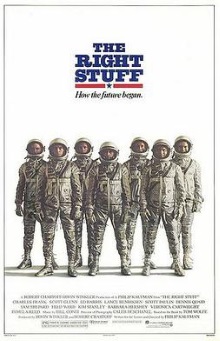
This one was added to my list because of how much I liked just about every film directed by Philip Kaufman that we’ve watched so far. I think this is not very well known today and was a commercial failure but it swept the Oscars at the time. I suppose it should also be considered a historically important film as today almost no one remembers the Mercury Seven or even the program itself though everyone knows about the Apollo program.
In 1947, test pilot Chuck Yeager becomes the first man to break the sound barrier. He and other pilots are based at what would later become Edwards Air Force Base, competing with each other to break new records and test new equipment. But then in 1957, the Soviet Union launches the Sputnik satellite and the space race kicks off. Yeager is excluded because he lacks a college degree and perhaps also because he is disdainful that the Mercury Program calls for test subjects and not real pilots. After a grueling series of tests, seven astronauts are selected to be trained. They are dubbed the Mercury Seven and the most prominent among them are John Glenn, Alan Shepard, Gordon Cooper and Virgil Grissom, all of whom immediately become national celebrities. Despite their best efforts, the Soviets still surpass American efforts as they struggle with technical problems. But the Mercury Seven do eventually manage to achieve milestone after milestone, culminating in achieving orbit with manned spacecraft. On the ground, in addition to having to face the constant risk of their husbands dying, their wives also have to confront their newfound celebrity status.
This is a hard film to summarize as it recounts the story of multiple characters over the course of a decade and a half. At over three hours long, it’s a bonafide historical epic with all the scope and grandeur that comes with the genre. Such long films can be draining to watch but I’m happy to report that this is very much not the case with The Right Stuff. Through adroit use of personal anecdotes, an excellent sense for drawing out the drama in all manner of details, a masterful interweaving of the theme that there must be some special quality to these pioneers in addition to their foolhardiness and thirst for glory, and sheer directorial skill, this is a constantly engrossing and entertaining watch. In lesser hands this could easily have turned into either a hagiography of the heroes of the early Space Age or a propaganda tool of the American government but this film always has sufficient self-awareness and willingness to poke holes in its heroes to avoid that misstep. A great example is its treatment of the gung-ho, all-American Boy Scout hero John Glenn. The film doesn’t make him out to be any less of a hero or less sincere, but he seems more human when it shows that he is aware of his effect on people and how others, even his wife, can see him as being faintly ridiculous in his earnestness.
Other details help tone down the rah-rah patriotic factor that only makes propaganda films stupid. It is hilarious that Shepherd, the first American in space, did so with pee in his pants. Also great is how Anne Glenn embarasses Lyndon Johnson by refusing to meet him despite him being the official head of the space program. The film does apparently take some artistic licence with regards to historical accuracy but they’re generally good choices. It hints that Glenn’s famous fireflies in space episode is linked with Australian aboriginal shamen, adding a touch of mysticism. Having Yeager all but steal an aircraft to break a new record and then crash it was too much however as it strains credibility that he would have any career after that if he had really done so. Overall I think it’s add up to a well-balanced, reasonably fair record of events.
With the future of aerial combat being clearly all about drones, the glory days of hotshot pilots are far behind us. The conflict between the science nerds and the maverick pilots as depicted here has now been firmly decided in favor of the scientists and engineers as autonomous rovers and spacecraft can do much more real science. Even in the film they acknowledge that the main advantage of human pilots is that they’re popular with the public and this makes it easier to raise funds for expensive projects. This gives the film a curious sense of nostalgia as we certainly don’t regard pilots and astronauts with this sort of awe any longer. I don’t much care for the machismo on display here but it did use to be part of that culture and this is a great portrayal of it. What I did especially appreciate is how it perfectly captures the sense of wonder that accompanied the first human forays into space. I’m very glad that Kaufman devoted so much screen time to Glenn’s first orbits. It ought to be boring and the view of Earth is nothing special these days but the giddy sense of excitement and wonder in Ed Harris’ voice as he describes everything he sees makes all the difference.
Once again Kaufman impresses me with a fine piece of craftsmanship and, again, it’s a film that is so very different from the others he has made. It’s also very educational and made me somewhat embarrassed about knowing so little about the precursor to the Apollo program. I’d rate this as a strong recommendation. Of course after finishing this I immediately looked for more of Kaufman’s works to add to our list but sadly it seems that we’ve come to the end of his more significant works.
One thought on “The Right Stuff (1983)”